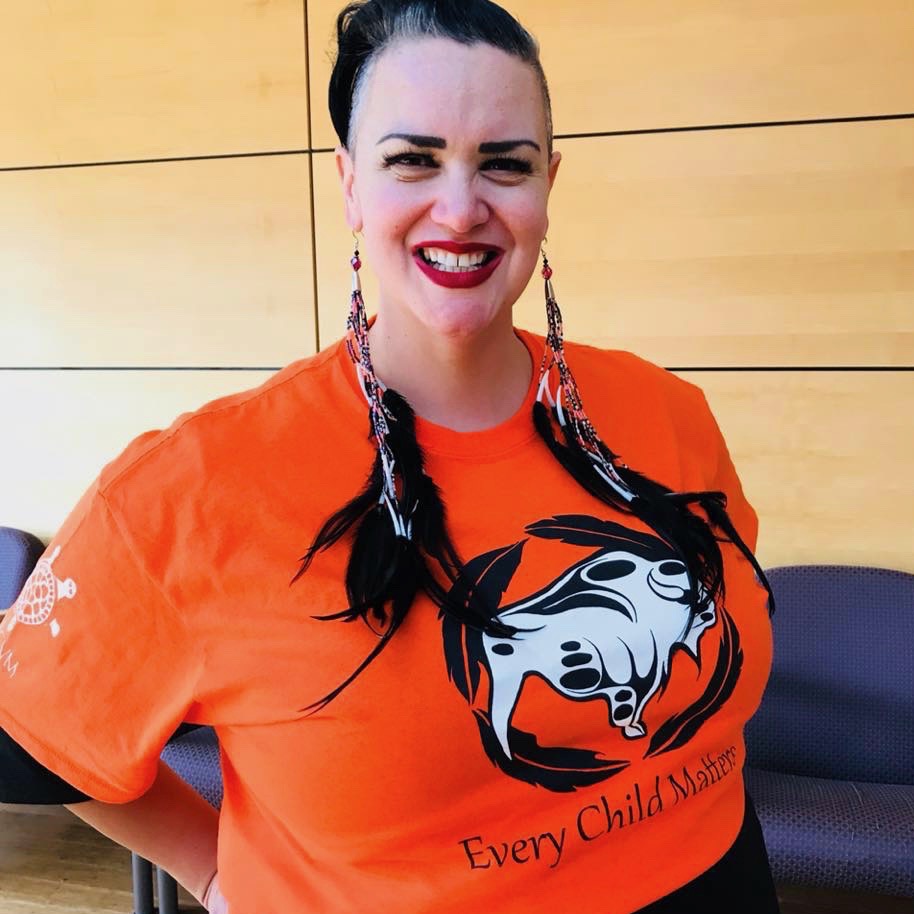Real-world lessons on Indigenous law and anti-colonialism at the heart of Prof. Tamara Pearl’s teaching and research
Doug Johnson - 1 May 2024
 Though she stands at the front of the classroom, Assistant Professor Tamara Pearl of the University of Alberta’s Faculty of Law strives to ensure everyone’s on even footing. This “anti-dominance” approach is rooted in anti-colonialism and stems from both her research and her life.
Though she stands at the front of the classroom, Assistant Professor Tamara Pearl of the University of Alberta’s Faculty of Law strives to ensure everyone’s on even footing. This “anti-dominance” approach is rooted in anti-colonialism and stems from both her research and her life.
This perspective on teaching, combined with her dedication to empowering the next generation of legal professionals, has earned Pearl the 2024 Tevie H. Miller Teaching Excellence Award.
"The Tevie H. Miller Teaching Excellence Award recognizes the exceptional teaching contributions of our faculty members, as identified by our students,” says Dean Barbara Billingsley. “As dean, I'm pleased to extend my personal congratulations to Tamara Pearl as the 2024 recipient of this award.”
“Many students wrote in support of Tamara's nomination for this award, expressing appreciation for her extensive knowledge of Indigenous Law, her caring approach to students, and the welcoming culture she creates in the classroom. Although Tamara is still in the early stages of her academic career, she is clearly making a positive impression on our students!"
“I am thrilled that I was chosen for the Tevie Miller Award because of what it stands for,” Pearl says. “I am grateful and will continue to do my best to contribute to the betterment of our community at the University of Alberta.”
Pearl is Nēhiyaw iskwew (Plains-Cree woman) from One Arrow First Nation and grew up in the core neighborhoods of Saskatoon but has strong connections to her family and Band, One Arrow First Nations in Treaty 6 territory. She first completed her bachelor’s of arts degree in anthropology. But her desire to better her community through a career dedicated to social justice led her to law, where she has completed her JD and LLM (masters of law) degrees at the University of Saskatchewan.
While completing her PhD in law at the University of Ontario, she first joined the U of A Faculty of Law as the Indigenous student support manager before being appointed as an assistant professor in 2022.
In this role, Pearl currently teaches several courses, including ones that pertain to Indigenous rights. These include LAW 594 - Gladue Principles Seminar — which aims to develop students’ understanding of a sentencing principle’s framework, which enables the courts to consider uncontroversial systemic discrimination factors when crafting fit and appropriate sentencing options for Indigenous offenders — and LAW 590 - Indigenous Peoples and Canadian Law.
She also led the creation of the Wahkohtowin Law and Governance Lodge’s Launchpad into Law. This summer program is designed to teach fundamental legal skills and Indigenous legal traditions to Indigenous students entering their first year of law school in the fall.
Pearl’s approach to, and passion for, teaching struck a chord with students. She regularly makes time after class to connect with her students and encourages them to follow their passions while exposing them to both the doctrinal jurisprudence in Canada and critical perspectives on the law’s impact. She strives to ensure her classes are welcoming and accepting of all Indigenous, 2SLGBTQ+ and students of diverse backgrounds.
Part of her “anti-dominance” to teaching approach is informed by her lived experiences. These include the Nēhiyaw concepts of tapahtîmisowin and kihciyimitowin. In short, the former means for one to never think higher of themself than others; the latter refers to a vital, almost sacred respect for others.
She also draws on her past experiences, including how her family and community has been impacted by aspects of Canadian law.
“While it can be personally challenging to bring all of myself into my lectures in this way, I believe this is the only way to provide for a holistic understanding of these areas of law,” says Pearl.
Both Pearl’s research and teaching aims to challenge settler-colonialism. She takes an “anti-dominance” approach to all of her interactions with students. The approach puts her and her students in a spirit of treaty partnering, and this environment ensures that she can share her extensive knowledge of law with them.
“It warms my heart, especially as an Indigenous woman, how strong and receptive law students have been in their willingness to learn and engage with information that is oftentimes difficult with sensitivity and genuine kindness,” she says. “This reflects the wonderful law student community we have at the Faculty of Law at the University of Alberta."